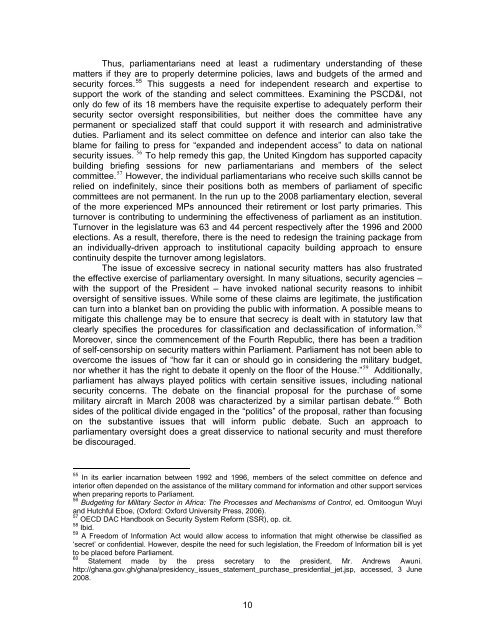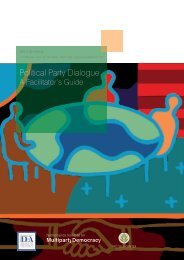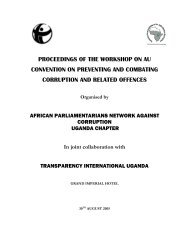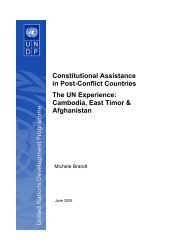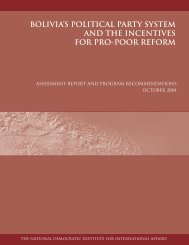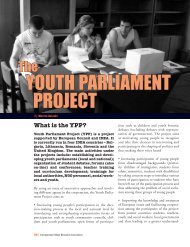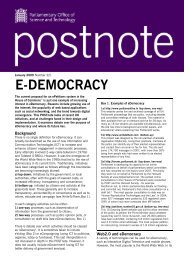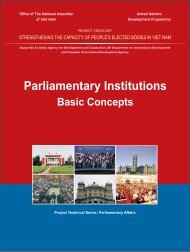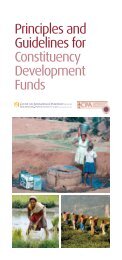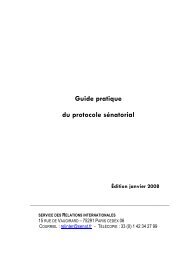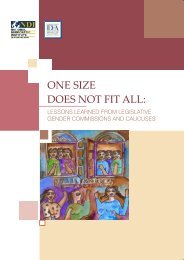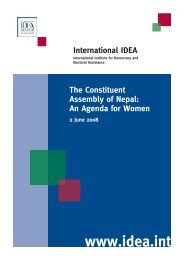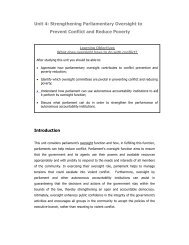Parliamentary Oversight of the Security Sector: Lessons from Ghana
Parliamentary Oversight of the Security Sector: Lessons from Ghana
Parliamentary Oversight of the Security Sector: Lessons from Ghana
Create successful ePaper yourself
Turn your PDF publications into a flip-book with our unique Google optimized e-Paper software.
Thus, parliamentarians need at least a rudimentary understanding <strong>of</strong> <strong>the</strong>sematters if <strong>the</strong>y are to properly determine policies, laws and budgets <strong>of</strong> <strong>the</strong> armed andsecurity forces. 55 This suggests a need for independent research and expertise tosupport <strong>the</strong> work <strong>of</strong> <strong>the</strong> standing and select committees. Examining <strong>the</strong> PSCD&I, notonly do few <strong>of</strong> its 18 members have <strong>the</strong> requisite expertise to adequately perform <strong>the</strong>irsecurity sector oversight responsibilities, but nei<strong>the</strong>r does <strong>the</strong> committee have anypermanent or specialized staff that could support it with research and administrativeduties. Parliament and its select committee on defence and interior can also take <strong>the</strong>blame for failing to press for “expanded and independent access” to data on nationalsecurity issues. 56 To help remedy this gap, <strong>the</strong> United Kingdom has supported capacitybuilding briefing sessions for new parliamentarians and members <strong>of</strong> <strong>the</strong> selectcommittee. 57 However, <strong>the</strong> individual parliamentarians who receive such skills cannot berelied on indefinitely, since <strong>the</strong>ir positions both as members <strong>of</strong> parliament <strong>of</strong> specificcommittees are not permanent. In <strong>the</strong> run up to <strong>the</strong> 2008 parliamentary election, several<strong>of</strong> <strong>the</strong> more experienced MPs announced <strong>the</strong>ir retirement or lost party primaries. Thisturnover is contributing to undermining <strong>the</strong> effectiveness <strong>of</strong> parliament as an institution.Turnover in <strong>the</strong> legislature was 63 and 44 percent respectively after <strong>the</strong> 1996 and 2000elections. As a result, <strong>the</strong>refore, <strong>the</strong>re is <strong>the</strong> need to redesign <strong>the</strong> training package <strong>from</strong>an individually-driven approach to institutional capacity building approach to ensurecontinuity despite <strong>the</strong> turnover among legislators.The issue <strong>of</strong> excessive secrecy in national security matters has also frustrated<strong>the</strong> effective exercise <strong>of</strong> parliamentary oversight. In many situations, security agencies –with <strong>the</strong> support <strong>of</strong> <strong>the</strong> President – have invoked national security reasons to inhibitoversight <strong>of</strong> sensitive issues. While some <strong>of</strong> <strong>the</strong>se claims are legitimate, <strong>the</strong> justificationcan turn into a blanket ban on providing <strong>the</strong> public with information. A possible means tomitigate this challenge may be to ensure that secrecy is dealt with in statutory law thatclearly specifies <strong>the</strong> procedures for classification and declassification <strong>of</strong> information. 58Moreover, since <strong>the</strong> commencement <strong>of</strong> <strong>the</strong> Fourth Republic, <strong>the</strong>re has been a tradition<strong>of</strong> self-censorship on security matters within Parliament. Parliament has not been able toovercome <strong>the</strong> issues <strong>of</strong> “how far it can or should go in considering <strong>the</strong> military budget,nor whe<strong>the</strong>r it has <strong>the</strong> right to debate it openly on <strong>the</strong> floor <strong>of</strong> <strong>the</strong> House.” 59 Additionally,parliament has always played politics with certain sensitive issues, including nationalsecurity concerns. The debate on <strong>the</strong> financial proposal for <strong>the</strong> purchase <strong>of</strong> somemilitary aircraft in March 2008 was characterized by a similar partisan debate. 60 Bothsides <strong>of</strong> <strong>the</strong> political divide engaged in <strong>the</strong> “politics” <strong>of</strong> <strong>the</strong> proposal, ra<strong>the</strong>r than focusingon <strong>the</strong> substantive issues that will inform public debate. Such an approach toparliamentary oversight does a great disservice to national security and must <strong>the</strong>reforebe discouraged.55 In its earlier incarnation between 1992 and 1996, members <strong>of</strong> <strong>the</strong> select committee on defence andinterior <strong>of</strong>ten depended on <strong>the</strong> assistance <strong>of</strong> <strong>the</strong> military command for information and o<strong>the</strong>r support serviceswhen preparing reports to Parliament.56 Budgeting for Military <strong>Sector</strong> in Africa: The Processes and Mechanisms <strong>of</strong> Control, ed. Omitoogun Wuyiand Hutchful Eboe, (Oxford: Oxford University Press, 2006).57 OECD DAC Handbook on <strong>Security</strong> System Reform (SSR), op. cit.58 Ibid.59 A Freedom <strong>of</strong> Information Act would allow access to information that might o<strong>the</strong>rwise be classified as‘secret’ or confidential. However, despite <strong>the</strong> need for such legislation, <strong>the</strong> Freedom <strong>of</strong> Information bill is yetto be placed before Parliament.60Statement made by <strong>the</strong> press secretary to <strong>the</strong> president, Mr. Andrews Awuni.http://ghana.gov.gh/ghana/presidency_issues_statement_purchase_presidential_jet.jsp, accessed, 3 June2008.10


